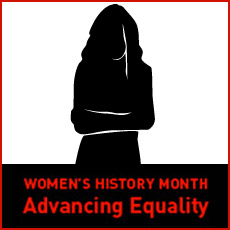
I graduated law school in 1975. The first woman was not appointed to the U.S. Supreme Court for another six years. Sandra Day O'Connor remained the only woman on the Supreme Court until 1993, when she was joined by Ruth Bader Ginsburg. Today, of course, there are three women on the Court: Justice Ginsburg, Justice Sonia Sotomayor, and Justice Elena Kagan.
The difference is immediately apparent to anyone sitting in the courtroom. The nation's highest court is no longer a men's club, and that matters. It matters not because women judges think alike. They don't. But the presence of three women on the bench helps give meaning to the promise of "Equal Justice Under Law" that is chiseled in stone above the entrance to the Supreme Court.
A few years ago, the ACLU represented Savana Redding, who was 13 years old when she was strip-searched by school officials looking for ibuprofen, which they never found. She sued, claiming that the search violated both her Fourth Amendment rights and her personal dignity. It was, she said, the most humiliating experience of her life.
The case reached the Supreme Court in April 2009. It was a troubling oral argument. The invasion of privacy that seemed so obvious and serious to me seemed less so to several members of the Court. At the time, Justice Ginsburg was the only woman on the Court — Justice O'Connor had retired three years earlier and Justice Sotomayor had not yet been nominated.
Shortly after the argument, Justice Ginsburg was interviewed by USA Today. During the course of the interview, she specifically referred to Savana Redding's case and the skepticism reflected in some of the questions that had been asked.
"They have never been a 13-year old girl," she said, referring to the other Justices. "It's a very sensitive age for a girl. I didn't think my colleagues, some of them, quite understood."
A few weeks later the Supreme Court ruled, by an 8-1 vote, that the strip search of Savana Redding was unconstitutional. Only Justice Clarence Thomas dissented from that conclusion.
The point of this story is not that Justice Ginsburg's public comments influenced the Court's private decision-making. I have no way of knowing that. But her comments highlight the importance of having people with diverse backgrounds and experiences on the Supreme Court. That includes racial minorities and it includes women.
The Supreme Court is our ultimate arbiter of justice. It also symbolizes our belief in the ideal of justice. For the ACLU, it is a source of great pride that Justice Ginsburg, who was instrumental in launching the ACLU's Women's Rights Project, has served on the Supreme Court for nearly 20 years. But the fact that she is no longer the only woman on the Supreme Court is even more important.
As Justice Ginsburg stated so simply but powerfully in her interview with USA Today: "Women belong in all places where decisions are being made."
We're holding a month-long blog symposium on women's rights for Women's History Month. See all the blog posts here, and learn more about women's rights: Subscribe to our newsletter, follow us on Twitter, and like us on Facebook.
